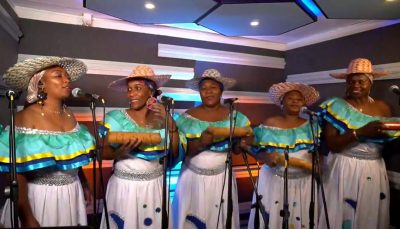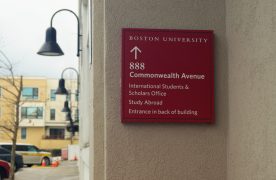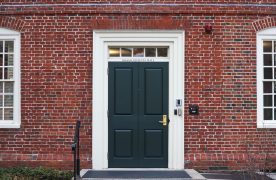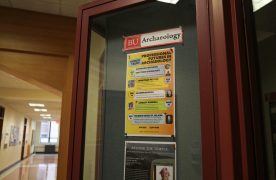Colombia has the biggest Black population in a Spanish-speaking country. Despite this, Afro-Colombian music and backgrounds are not well-documented in American society, according to Boston University assistant music professor Michael Birenbaum Quintero.

Birenbaum Quintero, who is also the chair of Musicology and Ethnomusicology at BU, facilitated discussions during BU Arts Initiative’s “Afro-Colombian Music, Culture and Politics” concert on Friday. The event featured performances from Canalón de Timbiquí — a band that honors traditional Afro-Colombian music on the Pacific coast.
After Canalón de Timbiquí played each song, Birenbaum Quintero prompted conversations with the band. Topics ranged from music in Colombia and the African diaspora to the instruments and the traditional materials used to make them.
In an interview, Birenbaum Quintero said the concert was difficult to organize — he had tried to host a Colombian music concert at BU several times.
“Finally, in the era of Zoom, although we weren’t able to bring the group to the United States or to campus,” Birenbaum Quintero said, “we were able to share some of the music and have a conversation for people.”
Birenbaum Quintero has known Canalón de Timbiquí for close to 17 years, he said, because he conducts research specifically on Colombian music. While the concert had to be held remotely, he said it was important to bring that music to the BU community regardless.
“We were able not just to have a concert where people go on stage and sing pretty songs and then it’s over,” Birenbaum Quintero said. “I think it was really important that we were able to do simultaneous translation, that we were able to translate the lyrics and that we were able to have a conversation.”
The band’s lead singer Nidia Góngora, along with four other women, sang the group’s vocals, while five men on various percussion instruments created a traditional beat to sing over.
During the concert, singers and instrumentalists performed in-studio, in front of bright-colored lights. The band’s performance, given in Spanish and translated live, included “Casa de la Compañía (The Firm’s House)” and “En Belén Nació (In Bethlehem was Born).”
For Góngora and the rest of the group, their music represents the mostly unheard music of southern Colombia, in addition to their culture and people. Góngora said the band has a platform to showcase that culture to the world.
“It’s important for us to work artistically while transforming the lives of our population, and here we are, thriving, fighting,” Góngora said during the event, translated by BU doctoral student Sebastián Wanumen-Jimenez. “We want our voices to be heard, because we are citizens, and we deserve being treated as citizens.”
Assistant Spanish professor David Colmenares, who attended the event, said many aspects of the performance and discussion were eye-opening. Comenares said Canalón de Timbiquí’s music is not as commercially consumed as other Latin-American music.
“It’s a rather remote area, so the possibility of listening to that vibrant music and culture, for us, it’s absolutely unique,” Comenares said. “The fact that these women have taken such a prominent role in not only in performing the music, but also at becoming reflected subjects about contemporary struggles and issues [in Colombia].”
These contemporary struggles, such as the lack of health benefits and resources, is something Góngora and her group discuss through their music.
The final song, “Quitate de mi escalera,” translated “Get off my ladder,” ended the concert on a musical note, which Birenbaum Quintero said was the purpose of the event.
“The people in the audience [can] get not only a sense of the sound of the music,” he said in an interview, “but of the meaning and the culture and the depth and the complexity and the beauty that underlies that music.”














